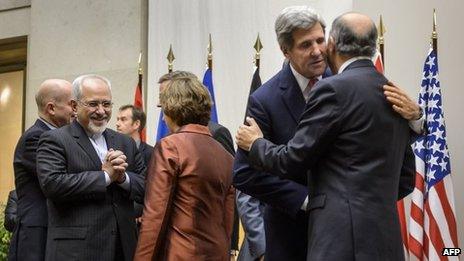Iran nuclear deal: Key points
- Published

World powers and Iran have begun implementing a deal on Iran's nuclear programme following intense talks in Geneva.
Both sides committed to a series of steps which will last for six months, while a more conclusive deal is negotiated.
Here are the key points of what the US says the two sides agreed, external:
What Iran will do
Halt production of near-20% enriched uranium and disable the configuration of the centrifuge cascades used to produce it
Start to dilute half of the near-20% enriched uranium stockpile that is in hexafluoride form, and continue to convert the rest to oxide form not suitable for further enrichment
Not enrich uranium in roughly half of the installed centrifuges at Natanz facility and three-quarters of the installed centrifuges at Fordo (Read our guide to Iran's nuclear facilities)
Limit its centrifuge production to those needed to replace damaged machines
Not construct additional enrichment facilities
Not go beyond its current enrichment research and development practices
Not commission or fuel the Arak heavy-water reactor
Halt the production and additional testing of fuel for the Arak reactor
Not install any additional reactor components at Arak
Not transfer fuel and heavy water to the Arak reactor site
Not construct a facility capable of reprocessing at Arak, preventing the separation of plutonium from spent fuel
Agree to a cap on the permitted size of Iran's up-to-5% enriched uranium stockpile
Allow IAEA inspectors to visit the Natanz and Fordo enrichment sites daily and the Arak reactor at least monthly
What the world powers will do
Provide "limited, temporary, targeted, and reversible [sanctions] relief". (See Q&A: Sanctions)
Not impose further nuclear-related sanctions if Iran meets its commitments
Transfer $4.2bn (£2.6bn) of oil revenue to Iran in instalments
Suspend the implementation of sanctions on Iran's petrochemical exports and its imports of goods and services for its automotive manufacturing sector
Pause efforts to further reduce purchases of crude oil from Iran by the six economies still purchasing oil from Iran
Suspend sanctions on Iran's imports and exports of gold and other precious metals
License the supply of spare parts and services for the safety of flight of Iran's civil aviation sector
Facilitate the establishment of a financial channel to support humanitarian trade already permitted with Iran and facilitate payments for UN obligations and tuition payments for students studying abroad
Modify the thresholds for EU internal procedures for the authorization of financial transactions